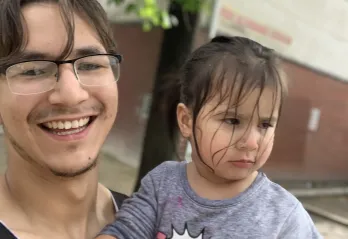Finding His Light

Through the Indigenous Achievers Program, Jordan stepped into his first full-time job—and discovered a deeper sense of purpose.
Jordan, a proud 19-year-old Winnipegger and lifelong basketball player, never expected building maintenance would be the spark that reignited his dreams. Then, through the YMCA-YWCA of Winnipeg’s Indigenous Achievers Program Jordan was able to access his first full-time job placement—helping maintain West End Commons, a non-profit housing complex in the city’s core.
“This job gave me a ‘whole’ feeling again,” says Jordan. “Like when I was playing for the U of W Collegiate Wesmen. We didn’t always win, but we held our heads high and kept going. That’s how this job made me feel—I was proud just to be in the game.”
The Indigenous Achievers Program provides Indigenous youth with paid job placements, mentorship, and employment readiness training—addressing persistent gaps in education and employment while creating pathways to meaningful careers. The program expanded this year through national partner funding from Rogers Youth Grants, making it available to even more Indigenous youth.
In Manitoba, youth unemployment (ages 15–24) is nearly double the overall provincial rate (10.0% vs. 5.1%)¹, and Indigenous youth across Canada face even greater barriers. Nationally, the Indigenous youth unemployment rate averaged 16.3% in 2024, compared to 12.6% for non-Indigenous youth².
Jordan was connected to the opportunity through a partnership between the Y and the Spence Neighbourhood Association (SNA), which offers paid job placements for youth who complete employment readiness programming. With SNA’s support and encouragement, Jordan began working as a Building Maintenance Technician—learning new skills in drywalling, tiling, safety checks, and emergency support for tenants. But for Jordan, the most important growth was personal.
“Some of the best skills I built were human ones,” he shares. “I learned how to talk with tenants, how to communicate my own needs, and how to show up—even when it was hard.”
Balancing work, child care, and sports wasn’t easy. Jordan faced physical and mental challenges, including persistent back pain and self-doubt about whether he was good enough for the role. But with encouragement from his supervisor Wren, and support from the building manager and coworkers, he kept going.
“They didn’t forget it was my first full-time job,” he says. “Their support gave me the confidence to face my thoughts, instead of running from them.”
Peter Chadwick, Youth Employment Support Coordinator at the YMCA-YWCA of Winnipeg, has seen firsthand how transformative this opportunity has been.
"Jordan’s journey is exactly why we do this work,” says Chadwick. “The Indigenous Achievers Program isn’t just about employment—it’s about building confidence, purpose, and community connection. With support from partners like Rogers, we’re able to create spaces where young people can thrive and discover their own strength. Watching Jordan grow into his role and step into his future with such determination has been incredibly inspiring.”
Marko Gjuric, General Manager, Community & Corporate Program Development at Y Winnipeg, notes the importance of that crucial first opportunity:
“A young person’s first paid job is much more than a paycheck—it builds independence, confidence, and resilience,” says Gjuric. “With support from Rogers Youth Grants, we’ve been able to support the Y in offering paid placements that often lead to ongoing employment. Sometimes all a young person needs is that first chance.”
The stakes are high: systemic barriers such as discrimination from employers, limited access to safe transportation, and child care responsibilities continue to impact Indigenous youth employment⁴. Without action, youth unemployment is projected to cost the Canadian economy $18.5 billion in GDP by 2034⁵. Initiatives like Indigenous Achievers are part of the solution—investments in young people that pay dividends for communities and the country.
Now, Jordan sees his work experience as the foundation of something bigger. “I set a new example for myself here. This was the beginning of shaping a better future—for myself and others,” he says. “Programs like this help young people find their light. The Y, SNA, and Rogers helped me find mine.”
Rogers Youth Grants support Canadian charitable and non-profit organizations that deliver educational and employment programs to youth ages 12–29 who are facing barriers. Thanks to support from Rogers, the Indigenous Achievers Program continues to provide paid job placements that help young people like Jordan gain confidence, learn vital life and employment skills, and build a brighter future—for themselves and their communities.
References
- Government of Manitoba. Labour Force Statistics Bulletin – April 2024. https://www.gov.mb.ca/mbs/publications/mbs203_lfs_bulletin_2024_m04.pdf
- The King’s Trust Canada. Fueling the Future Labour Policy Brief. November 2024, p. 9. https://www.kingstrust.ca/wp-content/uploads/2024/11/FTL-Policy-Brief-1.pdf
- Native Women’s Association of Canada. Generation 4 Equity Report, 2024, p. 4. https://www.nwac.ca/assets-documents/G4E-en-v4.pdf
- Native Women’s Association of Canada. Generation 4 Equity Report, 2024, p. 6. https://www.nwac.ca/assets-documents/G4E-en-v4.pdf
- The King’s Trust Canada. Youth Unemployment to Cost Canadian Economy $18.5 Billion by 2034, 2024. https://www.kingstrust.ca/news/youth-unemployment-to-cost-canadian-economy-18-5-billion-by-2034-warns-new-report/